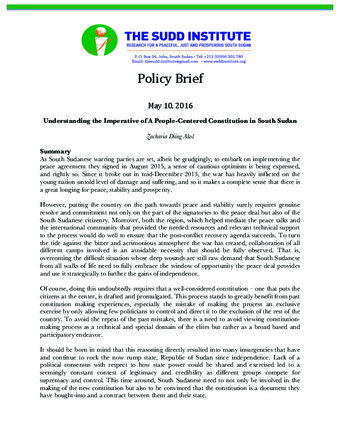Understanding the Imperative of A People-Centered Constitution in South Sudan

Organization: The Sudd Institute
Type: Policy Briefs
Date: 14/11/2016
Publication Summary
As South Sudanese warring parties are set, albeit be grudgingly, to embark on implementing the peace agreement they signed in August 2015, a sense of cautious optimism is being expressed, and rightly so. Since it broke out in mid-December 2013, the war has heavily inflicted on the young nation untold level of damage and suffering, and so it makes a complete sense that there is a great longing for peace, stability and prosperity.
However, putting the country on the path towards peace and stability surely requires genuine resolve and commitment not only on the part of the signatories to the peace deal but also of the South Sudanese citizenry. Moreover, both the region, which helped mediate the peace talks and the international community that provided the needed resources and relevant technical support to the process would do well to ensure that the post-conflict recovery agenda succeeds. To turn the tide against the bitter and acrimonious atmosphere the war has created, collaboration of all different camps involved is an avoidable necessity that should be fully observed. That is, overcoming the difficult situation whose deep wounds are still raw demand that South Sudanese from all walks of life need to fully embrace the window of opportunity the peace deal provides and use it strategically to further the gains of independence.
Of course, doing this undoubtedly requires that a well-considered constitution – one that puts the citizens at the center, is drafted and promulgated. This process stands to greatly benefit from past constitution making experiences, especially the mistake of making the process an exclusive exercise by only allowing few politicians to control and direct it to the exclusion of the rest of the country. To avoid the repeat of the past mistakes, there is a need to avoid viewing constitution-making process as a technical and special domain of the elites but rather as a broad based and participatory endeavor.
It should be born in mind that this reasoning directly resulted into many insurgencies that have and continue to rock the now rump state, Republic of Sudan since independence. Lack of a political consensus with respect to how state power could be shared and exercised led to a seemingly constant contest of legitimacy and credibility as different groups compete for supremacy and control. This time around, South Sudanese need to not only be involved in the making of the new constitution but also to be convinced that the constitution is a document they have bought-into and a contract between them and their state.
